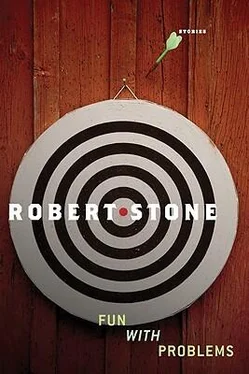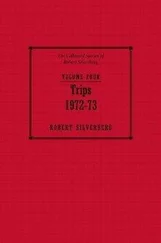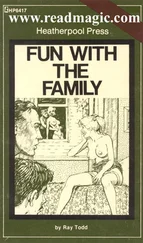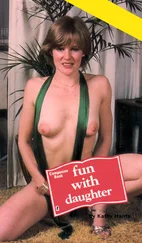Halfway across the prairie below Leroy's house was the Salikan River, of which his Irish Creek was a fork, and along the Salikan was an old mining town with the same name. Half the town's houses were post-sixties, alpine style or Old Westy, but there were fifties ranch houses, a steepled Mormon church and a black-and-white-movie motel at the top of the bluff over the river. An old general store stood beside it that had an Oakland Tribune newspaper rack on the wood sidewalk outside, though Oakland was nearly a thousand miles away, and insofar as Leroy could remember there was no such paper. Leroy parked his BMW out front.
The newspaper rack was always empty because Beck, the proprietor, was afraid that people would take newspapers without paying. Leroy himself had made a practice of doing that. Still, he wondered about Beck's savage irascibility. People around Salikan called Beck Caw or Crow or Craw or something of the sort, some sound they made. Craw was an older gentleman, as the wry youth of California said, God knew how old. There was a woman who worked with Craw sometimes, and Leroy had taken to thinking of her as Slob, which was his name for poorly groomed, overweight individuals. Slob, he presumed, was Craw's daughter, but who knew the relationships between these people?
Leroy straightened up as he stepped onto the wood sidewalk. Maybe it was the influence of westerns: something about shed-like buildings with wooden sidewalks made a man feel like walking tall. And Leroy was in good shape. He worked out regularly. He thought it made him stand out from the obese jerkarounds you saw in town and at the downscale mall in the valley. The little bell tinkled when he opened the door of Beck's store. Craw and Slob were both behind the counter.
"Afternoon, folks," Leroy said going in.
Old Craw looked at his watch. Slob gave him a soft hello.
"Hey, Beck," Leroy asked, "you got the Oakland Tribune? " Leroy thought he might have made that joke before. Old Beck never looked at him. The daughter answered.
"Hasn't been an Oakland Tribune for a great many years," she said. "I'm surprised you ever heard of it, your age."
Leroy was pleased. Indeed, he appeared considerably younger than his years.
"I haven't," he told her, and walked away. He heard the old man start to say something but get shushed by his daughter.
Strolling down to the dairy case to get some skim milk, he was reminded of the first heavyset person he referred to as Slob. He was good at nicknames, at least he thought so, and pretty original. Some people, he thought, practically named themselves by not caring how they looked. The other Slob was a young man who had worked for Leroy, a bit of a genius type, too much so. Leroy had started out calling him George. Slob the First became political and made objectionable noises about contracts with the Defense Department. Some systems went into the making of cool modes of weaponry that featured nasty surprises for enemy personnel and their dependents. Of course they did terrible things to people — they were weapons, for Christ's sake. As much as anything else they reminded Leroy of the computer war games at the research institute. But it was the age of the agitator; people needed to piss and moan. If Slob First had not been so obnoxious about it, Leroy would not have conceived the plan to make him disappear, corporately speaking.
While Leroy was fetching his quart of milk and dozen eggs, a bunch of drive-through tourists came in. The man was slight and overpolite to Craw and Slob behind the counter, tentative and ingratiating as your drive-through tourists tended to be. His wife acted the same way, smiley, hi there. The wife was a babe in nice-fitting jeans and a tight University of Wisconsin, Milwaukee, T-shirt with a blue hoodie over her hair. They had a child of about five, who unfortunately for the kid resembled his dad. While the couple fiddled around the counter, the lad wandered down the rows toward the dairy section where Leroy was getting his milk and eggs.
The little boy looked about him blankly. Leroy had a sudden impulse. Craw kept the candy under his birdy eye at the counter but his supply boxes were in the back, near where Leroy was standing. One carton of expensive chocolate bars stood beyond the child's reach but available to Leroy's. He reached up and took a bar of imported chocolate out. Catching the child's eye, he made a small clicking sound of conspiracy and handed it to him. After a moment the child took it and put it in his pocket.
At the counter Leroy paid a simmering Craw Beck for his purchases. Seven dollars, no less. The family group was at the counter behind him. Before Leroy reached the door, Craw exploded.
"You plan on paying for the boy's candy?"
He was speaking not to Leroy but to the father of the little boy.
"What candy?" the man asked.
"The candy in his pocket!" Craw said with a vicious smile. Beside him, Slob frowned. The wrapper was in plain view.
"He's not even allowed to eat candy!" the father said. More surprised, Leroy thought, than angry. A mild type. Leroy had paused with one hand on the door, a disinterested onlooker.
Turning to look at Leroy, the woman recalled what she had told herself she could not possibly have seen in the space of a moment. She gasped and pointed at him.
"That man!" she said. "He gave it to Todd. I'm sure he did."
Leroy shrugged. Slob looked at him suspiciously.
"Well, damn well put it back or somebody pay for it," said Craw.
Leroy went out at once and put the scene behind him.
Halfway between Beck's store and the post office he encountered a tall woman whom he had nicknamed Grannykins. It was not that she was particularly grandmotherly, only that the plain metal-rimmed glasses she wore lent her long lean face a certain severity. She came under Leroy's scornful definition of older lady; in fact, she was about his age. She was graying but distinctly handsome and had friendly brown eyes. He had first seen her on a horse. She had said hello to him that day, and he had the distinct impression that she was putting moves on him. It was just sad, he thought. She was so much older than any babe he would ever be seen with. Was she serious?
"And how are you today?" she asked, smiling. "I'm Sal," she reminded him. This woman, Leroy knew well enough, was really named Salikan, after the river. The idiotic name dated her pretty well, he thought, and he wondered how she lived with this embarrassment. Salikan, a dog's name. The thought made him grin, which she took as indicating pleasure in her company. He had the strongest impulse to explain to her what was funny, give her a tip about herself. Leroy had been told that Sal's parents had been rich hippies, descended from a Helena molybdenite tycoon. Leroy had never introduced himself, although she had told him her name many times before.
"Hi!" he said. He had to stop when she did.
"How are things with your house?"
"They're good."
"I ride up by your canyon sometimes," she said.
How pathetic, thought Leroy.
"Yeah, I've seen you."
"I don't go up there so much now. I've got wary."
"Right," Leroy said. "You can't be too careful."
Over her shoulder, he saw the flustered-looking tourist family approaching, snuffling little junior, angry mom, subdued loser dad. Sal saw that she had lost Leroy's interest and went away.
"Well, so long," she said. " You take care."
As the tourists passed, Leroy went into the post office to check his mail. Inside, a clerk stood behind the open parcel counter holding a fly swatter. Leroy went past him to the bank of post boxes, opened his and scooped out the useless paper, real estate ads and supermarket flyers. Just then his eye fell on a row of federal WANTED posters on a glass-cased bulletin board beside the street door and he sauntered over to inspect them. One of the fugitives, Leroy observed, was born Alan Ladd. He sometimes used "Bum" as an alias. Hilarious, thought Leroy. In fact, the man's face was a little daunting. The FBI wanted Bum for unlawful flight to avoid prosecution for the crime of murder, committed a few times over on little provocation. At a distance his picture resembled the old cartoon image of a burglar, plug-ugly in the striped shirt and wool cap. But even Leroy could see that there was a man behind the small dead eyes that looked at you over his flute of a nose. The peculiar nose, the lines around his mouth and his round chin made him look like a bad puppet. Pinocchio. The poster said Alan Ladd had worked as a dog trainer; his face was both swinish and prim. Leroy went out, climbed into his BMW and began the drive upriver toward his house.
Читать дальше












